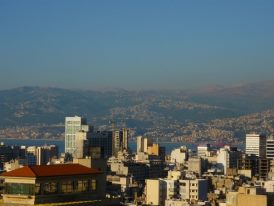The Poor in Lebanon: Victims of Destruction & Reconstruction

The poor and marginalized communities in Lebanon are the persons most affected by human rights violations, specifically their right to life and adequate standard of living. They have also been the victims of civil and Israeli wars, as well as victims of the post-war development and reconstruction policies.
In the mid-1990s, the Council for Development and Reconstruction contracted private companies for development in the city of Beirut, which has been termed the “Horizon 2000” plan. This plan has aroused considerable controversy, as it does not consider social development or provide support to the vulnerable communities that would be affected by the plan. An example of the negative impact of this “development” plan is the more than 300,000 persons who were subject to forced evictions and not receive adequate compensation. For more information on the situation of communities living in urban slums in Beirut, see the Urban Slums Report on Beirut published by UN Habitat in 2003.
The Solidere company is one of the primary companies that was contracted through the Horizon 2000 plan to develop the Beirut Central District. This company has been given many privileges, such as low prices on real estate, and their practices have come into question as a result of corrupt business practices regarding stolen land and a lack of transparency in its projects, as well as some financial scandals.
Many of these issues stem from the government policies. For example, a bill was recently presented to the Parliament’s Council on a new draft law regarding tenancy rights under the urban renewal plan. This law will displace approximately 25% of the Lebanese population as well as many local businesses without offering any alternative solutions. Also, in December 2011, the Council for Development and Construction launched a new project in cooperation with the World Bank in order to meet two objectives: 1) create the conditions for local economic development and enhanced quality of life in the historic centers of five main secondary cities; and 2) to improve the conservation and management of Lebanon`s built cultural heritage. This project will result in several forced evictions primarily in the most poverty stricken areas. Another type of threat is faced by the people living in “Smar Gebyail” village in north Lebanon, who are facing forced evictions and displacement due to environmental and health dangers from transmission towers owned by the private telecommunication companies located near their village.
The living conditions of many Palestinian refugees are also affected under the urban development plans, particularly for those affected by the crisis of Nahr El-Bared camp, which was destroyed in 2007 due to conflict between the Lebanese Army and Fatah Islam, displacing nearly 30,000 Palestinian refugees. Residents that lived in this refugee camp are complaining of the slow process of reconstructing the camp and the imposed restriction on the freedom of movement to and from the camp.
For refugees and Lebanese citizens living in impoverished areas, particularly those in Beirut, face insecurity in their housing situations, as the government seems uninterested in creating development for the benefit of these communities and has a clear respect for their rights or opinions in the development process.
|